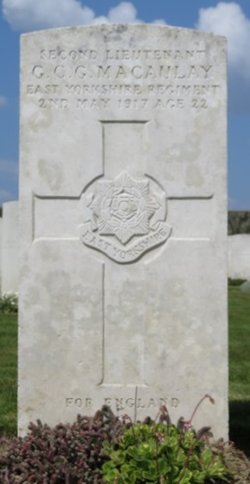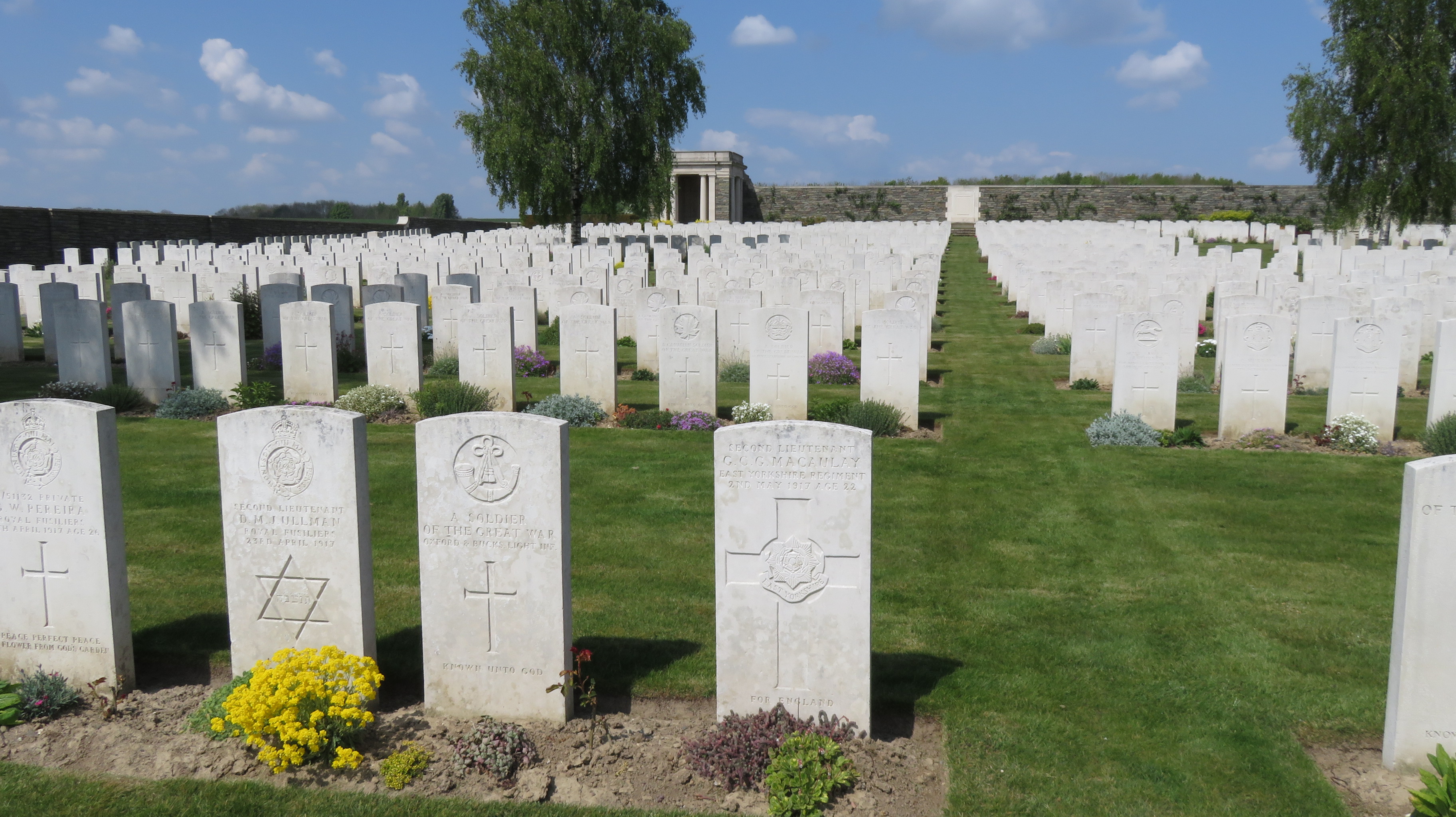Second Lieutenant
3rd Battalion, East Yorkshire Regiment.
Son of Margaret Macaulay, of Cardross, Oak Villas, Bradford, and the late A. Macaulay.
Student Officer Leeds University OTC.
Second Lieutenant 3rd (Special Reserve)
Battalion attached 13th (Service) Battalion
East Yorkshire Regiment (4th Hull,
‘T’Others’).
George Macaulay was the nephew and adopted son
of Aulay Macaulay. His father was Aulay’s elder
brother Colin, who died in 1895. His adopted father
and uncle married his servant Margaret, who was
half his age, in 1900. She wrote of George’s death in
1917 ‘he was an orphan nephew of my late husband
and has been our dearly beloved eldest son since he
was four years of age.’ Aulay Macaulay, originally
from Heckmondwike, was a solicitor and clerk to
both the District Council and the West Riding
magistrates bench. George’s first school was in
Harrogate. He went to Bradford Grammar School at
the start of 1904 when he was ten, and left at the
end of 1908 aged fourteen. He was presented with a
copy of Scott’s ‘Ivanhoe’ as second prize in the
Lower IVth form in July 1904, and he later won
prizes for reading and for writing. In the summer of
1906 he captained the Pinks junior cricket team. In
January 1909 he went to Rossall School on the
Lancashire coast as a boarder. He became a House
Monitor and a Sergeant in the OTC, but above all it
was his cricket which flourished as a batsman and
fielder. On his return to Bradford in 1912 he was
apprenticed to his father’s law firm. He joined
Heckmondwike Cricket Club in 1913, for whom he
was considered a noteworthy recruit. His father, who
died in the same year, had also played for the club.
Within days of the outbreak of war in August 1914
George applied for a commission. However,
although passed fit and recommended by the
Colonel of the Duke of Wellington’s Regiment at
Halifax, he was impatient and in September enlisted
in London as a private in the Public Schools
Battalion (16th Middlesex). He was commissioned
into the 3rd Battalion East Yorkshire Regiment the
following February, his former CO writing ‘He is likely
to make a “good officer”, in my opinion.’ He went to
France later in the same year and was attached to
the 60th Trench Mortar Battery (20th Division), which
brought a temporary promotion to Lieutenant as he
was in command of two hundred men. On 16th September 1916 George was wounded in the left
hand by a shell fragment. Although the wound was
slight, it brought him back to England for two months,
however he also had to revert to the rank of Second
Lieutenant. After his return to France, at the start of
April 1917 he was attached to the 13th Battalion East
Yorkshire Regiment, the 4th Hull Pals known as
‘T’Others’, joining them near Arras where the British
Spring Offensive was about to commence.
On the night of 29th-30th April the 13/East Yorkshires
took over the front line opposite the German-held
village of Oppy. During the next day they were
bombarded with gas shells, and also repulsed an
attack with grenades and rifle grenades. Late on the
night of 2nd May they were withdrawn to provide
carrying parties for the attack due to commence early
the following morning. The Battalion War Diary
devotes a single line to 2nd May’s activities and it
neglects to report that two officers and seven other
ranks were killed. There is evidence they may have
died in an unrecorded action involving grenades. One
of them, Second Lieutenant Hamm, was a bombing
officer. Macaulay had also performed this duty, and
one of the dead privates is also recorded to have
been throwing bombs and was killed while carrying off
the wounded. Four of the dead including George
Macaulay were buried in Bailleul Sunken Road
Cemetery, then later re-buried in Orchard Dump
Cemetery.
Second Lieutenant
3rd Battalion, East Yorkshire Regiment.
Son of Margaret Macaulay, of Cardross, Oak Villas, Bradford, and the late A. Macaulay.
Student Officer Leeds University OTC.
Second Lieutenant 3rd (Special Reserve)
Battalion attached 13th (Service) Battalion
East Yorkshire Regiment (4th Hull,
‘T’Others’).
George Macaulay was the nephew and adopted son
of Aulay Macaulay. His father was Aulay’s elder
brother Colin, who died in 1895. His adopted father
and uncle married his servant Margaret, who was
half his age, in 1900. She wrote of George’s death in
1917 ‘he was an orphan nephew of my late husband
and has been our dearly beloved eldest son since he
was four years of age.’ Aulay Macaulay, originally
from Heckmondwike, was a solicitor and clerk to
both the District Council and the West Riding
magistrates bench. George’s first school was in
Harrogate. He went to Bradford Grammar School at
the start of 1904 when he was ten, and left at the
end of 1908 aged fourteen. He was presented with a
copy of Scott’s ‘Ivanhoe’ as second prize in the
Lower IVth form in July 1904, and he later won
prizes for reading and for writing. In the summer of
1906 he captained the Pinks junior cricket team. In
January 1909 he went to Rossall School on the
Lancashire coast as a boarder. He became a House
Monitor and a Sergeant in the OTC, but above all it
was his cricket which flourished as a batsman and
fielder. On his return to Bradford in 1912 he was
apprenticed to his father’s law firm. He joined
Heckmondwike Cricket Club in 1913, for whom he
was considered a noteworthy recruit. His father, who
died in the same year, had also played for the club.
Within days of the outbreak of war in August 1914
George applied for a commission. However,
although passed fit and recommended by the
Colonel of the Duke of Wellington’s Regiment at
Halifax, he was impatient and in September enlisted
in London as a private in the Public Schools
Battalion (16th Middlesex). He was commissioned
into the 3rd Battalion East Yorkshire Regiment the
following February, his former CO writing ‘He is likely
to make a “good officer”, in my opinion.’ He went to
France later in the same year and was attached to
the 60th Trench Mortar Battery (20th Division), which
brought a temporary promotion to Lieutenant as he
was in command of two hundred men. On 16th September 1916 George was wounded in the left
hand by a shell fragment. Although the wound was
slight, it brought him back to England for two months,
however he also had to revert to the rank of Second
Lieutenant. After his return to France, at the start of
April 1917 he was attached to the 13th Battalion East
Yorkshire Regiment, the 4th Hull Pals known as
‘T’Others’, joining them near Arras where the British
Spring Offensive was about to commence.
On the night of 29th-30th April the 13/East Yorkshires
took over the front line opposite the German-held
village of Oppy. During the next day they were
bombarded with gas shells, and also repulsed an
attack with grenades and rifle grenades. Late on the
night of 2nd May they were withdrawn to provide
carrying parties for the attack due to commence early
the following morning. The Battalion War Diary
devotes a single line to 2nd May’s activities and it
neglects to report that two officers and seven other
ranks were killed. There is evidence they may have
died in an unrecorded action involving grenades. One
of them, Second Lieutenant Hamm, was a bombing
officer. Macaulay had also performed this duty, and
one of the dead privates is also recorded to have
been throwing bombs and was killed while carrying off
the wounded. Four of the dead including George
Macaulay were buried in Bailleul Sunken Road
Cemetery, then later re-buried in Orchard Dump
Cemetery.
Sponsored by Ancestry
Advertisement
Advertisement



